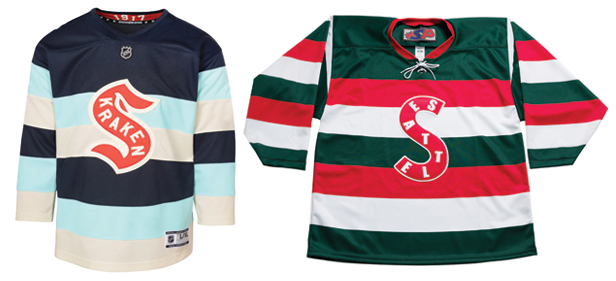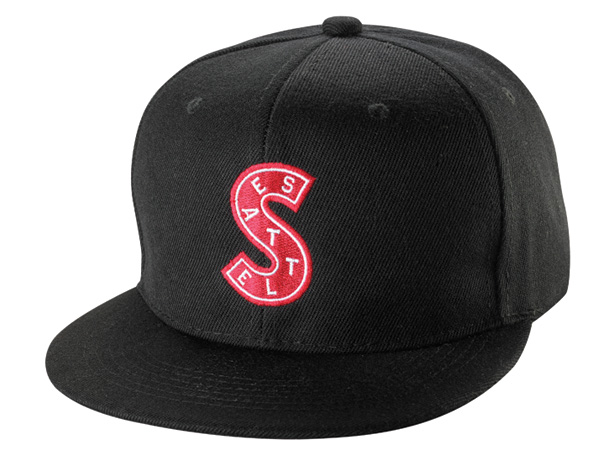March 07, 2024
Seattle Kraken File Counterclaims, New Dismissal Request in Merch Lawsuit
The case centers on allegations of trademark infringement tied to the 2024 Winter Classic jersey for the NHL team, in which a promo industry leader holds minority ownership.
The gloves have been thrown to the ice and it appears to be bare-knuckle time in a hockey-centered court battle involving allegations of trademark infringement, branded merchandise and a professional team co-owned by a prominent promotional products industry executive.
The puck dropped on the case in December when Washington resident Paul Kim sued the ownership of the National Hockey League’s Seattle Kraken.

The Seattle Kraken’s special Winter Classic jersey that’s subject to the trademark infringement allegations is on the left. The Seattle Metropolitans jersey is on the right.
Kim asserted that Seattle Hockey Partners LLC violated trademarks his Seattle Metropolitans Hockey LLC merch company legally holds in the special logo and jersey designs it created for players to wear in the New Year’s Day Winter Classic – an outdoor game held at T-Mobile Park in Seattle. The Metropolitans are a long-defunct professional hockey team that holds the distinction of being the first U.S.-based club to win the Stanley Cup – a feat achieved in 1917.
One attempt by the Kraken owners to have Kim’s suit dismissed failed, but now they’ve filed counterclaims and another request for dismissal.
Jay Deutsch, CEO of Woodinville, WA-headquartered Top 40 distributor BDA (asi/137616) and a member of Counselor’s Power 50 list of the industry’s most influential people, is a minority owner in the Kraken. Deutsch has told ASI Media that he can’t comment on the case because the litigation is ongoing.
Kraken Call for Partial Cancellation of Trademarks
In January, the Kraken owners asked a judge to chuck Kim’s suit, alleging it lacked the facts to support his state law claims for conversion and tortious interference.
Kim countered by filing an amended complaint that removed claims of conversion, which occurs when one party takes the chattel property of another with the intent to deprive them of it, and tortious interference, which happens when a party outside of a contract or business relationship interferes with another’s economic advantage or business contracts in a “wrongful” manner.
“Because Seattle Metropolitans has abandoned the claims that Seattle Hockey Partners sought to dismiss, the court denies Seattle Hockey Partners’ motion [to dismiss] as moot,” wrote U.S. District Judge James L. Robart in response to the January-filed dismissal request.
The ruling far from settled the matter.
At the end of February, Seattle Hockey Partners answered Kim with counterclaims and a request to have the new amended complaint dismissed. The filing also asked that Kim be made to pay the Kraken owners’ fees, expenses and costs tied to the case, as well as other relief a judge would deem appropriate.
A Washington state entrepreneur wants to put the Seattle Kraken in the penalty box in a trademark infringement lawsuit centered on a special logo, #merch, and a defunct but historic hockey team.https://t.co/mMXhe9z4vE
— Chris Ruvo (@ChrisR_ASI) January 2, 2024
Counterclaims called for the partial cancellation of a trademark Kim holds on the term “Seattle Metropolitans” and its “S Seattle” logo as it pertains to use of what’s known as Class 41 services – particularly, “museum services, namely, display of memorabilia and artifacts pertaining to an historical Seattle professional ice hockey team, and providing a website featuring information regarding the history of this ice hockey team; conducting guided walking tours of a city and its landmarks; and organizing, arranging and conducting of ice hockey games.”
In part, the counterclaim said the term “Seattle Metropolitans” and “S Seattle” logo Kim stakes his case on do not qualify for such trademark protection and are not eligible for federal registration on the Principal Register, which is reserved for trademarks considered under the law to be “distinctive.”
“To qualify for trademark protection and registration, plaintiff must show that ‘Seattle Metropolitans’ and the ‘S Seattle’ logo have acquired distinctiveness or ‘secondary meaning’ as trademarks for the Class 41 Services through long, extensive, continuous and substantially exclusive use by the plaintiff,” the Kraken owners’ counterclaim read. Kim’s use has been “too little and for far too short a period…to acquire distinctiveness. Accordingly, neither ‘Seattle Metropolitans’ nor the ‘S Seattle’ logo is sufficiently distinctive to be eligible for registration on the Principal Register.”
For similar reasons, another trademark registration must be canceled as it relates to Class 41 Services and an application Kim filed for additional trademark protection on the “S Seattle” logo in December should be refused, according to the counter claims.
A judge has not yet made a ruling.
Primer: How To Handle Trademark Infringement Issues https://t.co/CgxQne4DW5
— Chris Ruvo (@ChrisR_ASI) June 21, 2023
Kim’s Complaint
According to court records, Kim is originally from South Korea. When he came to the United States, a teacher gave him a book on Seattle hockey history to help him learn English.
It was the beginning of a love affair with the game and Seattle hockey/the Metropolitans for Kim, who played the sport as a youth. While a college student, Kim reportedly acquired the trademark rights to the name and “S” logo of the Seattle Metropolitans.
Keen to keep alive the Metropolitans legacy and help bring a professional team back to Seattle (the Kraken were not yet around), Kim then began selling Metropolitans branded merchandise, according to the lawsuit. The complaint says that Kim’s merch has sold in 34 states and even internationally. Items include jerseys, T-shirts, hats and stickers.

This snapback hat is among the Seattle Metropolitans-branded merchandise Paul Kim sells on his website.
The logo the Kraken developed for their Winter Classic jerseys and related branded merchandise is “virtually identical” to the Metropolitans logo – and thus a trademark violation, the lawsuit asserts. The jersey logo incorporates the “S,” red color, white border and white block letter design of the federally registered Metropolitans “S” logo, the court filing says.
The suit maintains that the Kraken approached Kim multiple times about licensing or acquiring the rights to Metropolitans’ marks, but the proffered compensation was inadequate.
In his amended complaint, Kim accuses the Kraken of federal and common law trademark infringement, a Consumer Protection Act violation, false designation of origin and unfair competition, and unjust enrichment.
He asks a judge to slap injunctions on the Kraken that prevent the club from using the Seattle Metropolitans name and logo. He’s also seeking financial compensation for alleged damages, including profits the Kraken accrued from the alleged offending merch.
He wants the Kraken to turn over products, marketing materials, business forms and other items that have the Seattle Metropolitans name and/or branding – all so they can be destroyed.
Last year, ASI Media spoke with legal experts for tips on avoiding trademark infringement when creating logos and graphics – a topic of relevance for the promotional products industry. The experts also gave advice on what to do if your trademark has been infringed upon, or if you’ve been hit with a violation claim.
One way to avoid committing trademark infringement? Conduct a comprehensive trademark search – a process that includes undertaking a review in the U.S. Patent and Trademark Office’s Trademark Electronic Search System (TESS).